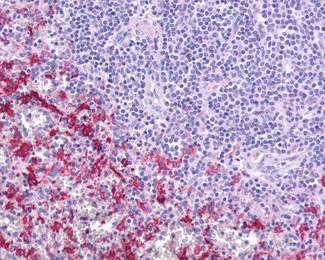HCAR3 / GPR109B / HM74 Antibody (N-Terminus)
Rabbit Polyclonal Antibody
- SPECIFICATION
- CITATIONS
- PROTOCOLS
- BACKGROUND

Application
| IHC-P, ICC |
|---|---|
| Primary Accession | P49019 |
| Reactivity | Human |
| Host | Rabbit |
| Clonality | Polyclonal |
| Calculated MW | 44kDa |
| Dilution | IHC-P (3-4 µg/ml) |
| Gene ID | 8843 |
|---|---|
| Other Names | Hydroxycarboxylic acid receptor 3, G-protein coupled receptor 109B, G-protein coupled receptor HM74, G-protein coupled receptor HM74B, Niacin receptor 2, Nicotinic acid receptor 2, HCAR3, GPR109B, HCA3, HM74B, NIACR2 |
| Target/Specificity | Human GPR109B / HM74. BLAST analysis of the peptide immunogen showed no homology with other human proteins, except HCAR2 (100%). |
| Reconstitution & Storage | Long term: -70°C; Short term: +4°C |
| Precautions | HCAR3 / GPR109B / HM74 Antibody (N-Terminus) is for research use only and not for use in diagnostic or therapeutic procedures. |
| Name | HCAR3 |
|---|---|
| Function | G-protein coupled receptor for 3-hydroxyoctanoate, a fatty acid beta-oxidation intermediate. Signals through the inhibitory G(i)/o family of G-proteins (PubMed:19561068, PubMed:37736747, PubMed:39427321). Acts as a negative feedback regulator of adipocyte lipolysis, helping to counterbalance prolipolytic signals during physiological or pathological elevations in beta-oxidation (PubMed:19561068). Acts as a low affinity receptor for nicotinic acid. This pharmacological effect requires nicotinic acid doses that are much higher than those provided by a normal diet (PubMed:12522134). |
| Cellular Location | Cell membrane; Multi-pass membrane protein |
| Tissue Location | Expression largely restricted to adipose tissue and spleen. |
| Volume | 50 µl |

Thousands of laboratories across the world have published research that depended on the performance of antibodies from Abcepta to advance their research. Check out links to articles that cite our products in major peer-reviewed journals, organized by research category.
info@abcepta.com, and receive a free "I Love Antibodies" mug.
Provided below are standard protocols that you may find useful for product applications.
Background
Receptor for 3-OH-octanoid acid mediates a negative feedback regulation of adipocyte lipolysis to counteract prolipolytic influences under conditions of physiological or pathological increases in beta-oxidation rates. Acts as a low affinity receptor for nicotinic acid. This pharmacological effect requires nicotinic acid doses that are much higher than those provided by a normal diet.
References
Nomura H.,et al.Int. Immunol. 5:1239-1249(1993).
Suwa M.,et al.Submitted (JUL-2001) to the EMBL/GenBank/DDBJ databases.
Ota T.,et al.Nat. Genet. 36:40-45(2004).
Scherer S.E.,et al.Nature 440:346-351(2006).
Wise A.,et al.J. Biol. Chem. 278:9869-9874(2003).
If you have used an Abcepta product and would like to share how it has performed, please click on the "Submit Review" button and provide the requested information. Our staff will examine and post your review and contact you if needed.
If you have any additional inquiries please email technical services at tech@abcepta.com.













 Foundational characteristics of cancer include proliferation, angiogenesis, migration, evasion of apoptosis, and cellular immortality. Find key markers for these cellular processes and antibodies to detect them.
Foundational characteristics of cancer include proliferation, angiogenesis, migration, evasion of apoptosis, and cellular immortality. Find key markers for these cellular processes and antibodies to detect them. The SUMOplot™ Analysis Program predicts and scores sumoylation sites in your protein. SUMOylation is a post-translational modification involved in various cellular processes, such as nuclear-cytosolic transport, transcriptional regulation, apoptosis, protein stability, response to stress, and progression through the cell cycle.
The SUMOplot™ Analysis Program predicts and scores sumoylation sites in your protein. SUMOylation is a post-translational modification involved in various cellular processes, such as nuclear-cytosolic transport, transcriptional regulation, apoptosis, protein stability, response to stress, and progression through the cell cycle. The Autophagy Receptor Motif Plotter predicts and scores autophagy receptor binding sites in your protein. Identifying proteins connected to this pathway is critical to understanding the role of autophagy in physiological as well as pathological processes such as development, differentiation, neurodegenerative diseases, stress, infection, and cancer.
The Autophagy Receptor Motif Plotter predicts and scores autophagy receptor binding sites in your protein. Identifying proteins connected to this pathway is critical to understanding the role of autophagy in physiological as well as pathological processes such as development, differentiation, neurodegenerative diseases, stress, infection, and cancer.


